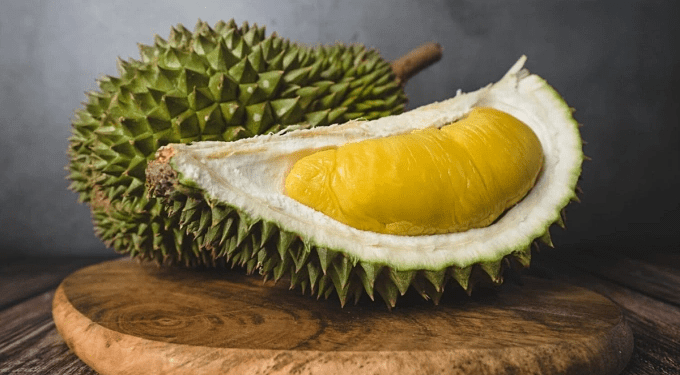Raay Lim, 32, made his livestreaming debut on TikTok Shop selling durians in June 2023. He had first opened a physical shop a few years earlier during the Covid-19 pandemic.
Named Zen Zu Fu Durians, his business is now based at a curbside stall in the Tiong Bahru neighborhood and pulls in an estimated six-figure revenue from that platform alone during the peak season. A 500-gram box of mao shan wang, or Musang King, would fetch S$50 (US$39), matching the rates at his stall.
 |
|
A promotional image of durians for sale online. Photo courtesy of Durian Delivery Singapore |
For Lim, livestreaming is not just about selling durians. They can sometimes drift from small talk to deeper issues like rising living costs and supporting acquaintances with mental health struggles.
“It’s about 20% selling and 80% chatting,” he told The Straits Times, explaining that he prefers to foster a sense of community rather than just pressuring people to buy.
“When people know your sincerity and who you are, they are more likely to buy from you.”
Some sessions stretch as long as six hours and, on average, viewers stay tuned for about two hours, but mostly for Lim.
One loyal follower, 39-year-old Ng Shu Huai, who has been watching Zen Zu Fu’s TikTok streams for a year as an after-work habit, praised Lim’s honesty and sincerity.
“He never hard sells and (he) remembers viewers’ names, preferences and where they live,” she said.
Similar to Lim, many sellers in the city-state have taken their pungent fruit to TikTok Shop. Within the last year, the app has seen a roughly 40% increase in durian sellers and a 185% surge in gross merchandise value.
Jeremy Chew, owner of Royal Durian, which has been operating online for the last six years, said Singapore’s durian industry is “very easy” to break into.
At the height of the season, the city-state can bring in more than 100,000 kilograms of durians a day from Malaysia, which accounts for 85% of its durian supply, according to Bloomberg.
During the same period, a dozen durian sellers could be concurrently seen on TikTok livestreams, Chew said.
Dr Samer El Hajjar, senior marketing lecturer at the National University of Singapore’s Business School, said the rise of online durian sales is fueled in part by delivery convenience.
But he cautioned that digital retail has its limits, especially when buyers cannot touch, smell, or inspect the notoriously pungent fruit before committing to a purchase.
“No one wants to pay a premium for an item that’s not good enough, and that’s actually the fundamental of purchasing behaviors in the online game,” he told Channel News Asia.
Royal Durian’s Chew also raised doubts about whether many online sellers can sustain their businesses.
“The fact is, can you do it well? Are you doing it as a hobby or can you really do it long term?”
Dr El Hajjar said customers naturally gravitate toward sellers with stronger reputations. Hence, established brick-and-mortar shops will likely still do well despite online competition.
One such store is Combat Durian, which has been around for six decades and been mostly unaffected by online sellers. The family business said it is not only about offering fair prices and good quality, but also about providing an experience that online platforms cannot match.
This season, businesses in the city-state rolled out various deals for local durian lovers, including huge discounts at supermarkets and all-you-can-eat buffets, many of which drew eager crowds.
At the same time, many residents made the short trip across the border to savor the fruit at its source. This was especially prevalent this year, with the general election held in May, as it has become a tradition for Singaporeans to join durian tours organized by Members of Parliament post-poll, according to tourism operators cited by the South China Morning Post.





